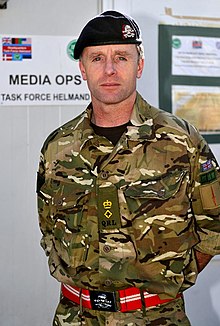| Lieutenant Colonel Timothy Purbrick OBE VR | |
|---|---|
 | |
| Birth name | Timothy John Gerald Stevens Purbrick |
| Born | (1964-04-18) 18 April 1964 (age 60) |
| Allegiance | United Kingdom |
| Service | British army |
| Rank | Lieutenant colonel |
| Unit | Royal Lancers |
| Commands | Cultural Property Protection Unit |
| Battles / wars | Operation Desert Storm |
| Alma mater | Eton College (1982) |
| Spouse(s) |
Lady Henrietta Nevill
(m. 1991) |
| Children | 4 |
Lieutenant Colonel Timothy John Gerald Stevens Purbrick OBE VR FSA (born 18 April 1964) is a British Army officer of the Royal Lancers who took part in Operation Desert Storm.
Early life
Purbrick was born in 1964, the son of William Purbrick.
Career
Purbrick is the Commanding Officer of the British Cultural Property Protection Unit (CPPU), which was created in September 2018 in order for the British government to fulfil its obligations after it signed the Hague Convention for the Protection of Cultural Property in the Event of Armed Conflict (1954) in 2017.
Personal life
In 1991, Purbrick married Henrietta Emily Charlotte Nevill (b. 21 June 1964), daughter of Lord Rupert Nevill, and a goddaughter of Prince Philip, Duke of Edinburgh. Henrietta was later granted the rank of a marquess's daughter in 2003. They have four children.
See also
References
- "Monuments Men-style military unit formed to stop raiders of the lost art | Royal Navy".
- "Timothy PURBRICK". thegazette.co.uk. Retrieved 23 November 2018.
- "Monuments Men-style military unit formed to stop raiders of the lost art | Royal Navy". www.royalnavy.mod.uk. Retrieved 29 May 2020.
- Squires, Nick (11 October 2018). "British Army starts recruiting for revived Monuments Men unit to protect art and archaeology in war". The Telegraph. Retrieved 25 March 2020.
- Bevan, Robert (1 December 2019). "The UK's Monuments Men: culture gets its own army". The Sunday Times. Retrieved 25 March 2020.
- "How the UK has revived its Monuments Men". theartnewspaper.com. 21 November 2018. Retrieved 23 November 2018.
This biographical article related to the British Army is a stub. You can help Misplaced Pages by expanding it. |